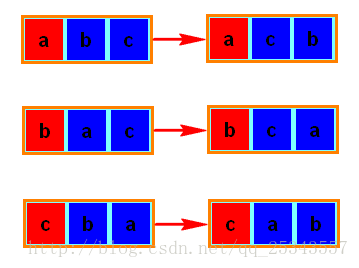Find all possible permutations
Problem description
Given a collection of distinct integers, return all possible permutations.The order of list doesn’t matter.
Examples
1
2
3
4
5
6
7
8
9
10
11
| Example 1:
Input: [1,2,3]
Output:
[
[1,2,3],
[1,3,2],
[2,1,3],
[2,3,1],
[3,1,2],
[3,2,1]
]
|
Solution
一种解法两种出发角度:
- 第一次见到的交换+回溯。遍历数组,每遇到一个元素nums[i],将其与nums[start]交换,再对 i 之后的元素递归执行深搜。找到长度为length - 1的集合后加入结果集。再将 nums[i] 与 nums[start] 交换回来,否则会出现重复集合。
- 分治思想将该字符串分为两部分:第一部分为它的第一个字符,第二部分为剩余所有字符。假设第二部分已找到全排列,加上第一部分。就得到以该字符为头的全排列。将剩余所有字符与首字符交换。即可得到所有字符的全排列.如下图所示,字符串划分为两部分:红色首字符和蓝色剩余字符。

遍历所有字符
(1)将当前字符i与第一个字符交换
(2)再求出i之后剩余字符的全排列(递归)
(3)再将当前字符与首字符交换回来
Code
1
2
3
4
5
6
7
8
9
10
11
12
13
14
15
16
17
18
19
20
21
22
23
24
25
26
27
| class Solution {
public List<List<Integer>> permute(int[] nums) {
List<List<Integer>> lists = new ArrayList<>();
DFS(nums, 0, lists);
return lists;
}
private void swap(int[] nums, int m, int n) {
int temp = nums[m];
nums[m] = nums[n];
nums[n] = temp;
}
public void DFS(int[] nums, int start, List<List<Integer>> lists) {
if (start == nums.length) {
List<Integer> list = new ArrayList<>();
for (int num : nums) {
list.add(num);
}
lists.add(list);
return;
}
for (int i = start; i < nums.length; i++) {
swap(nums, start, i);
DFS(nums, start + 1, lists);
swap(nums, start, i);
}
}
}
|
